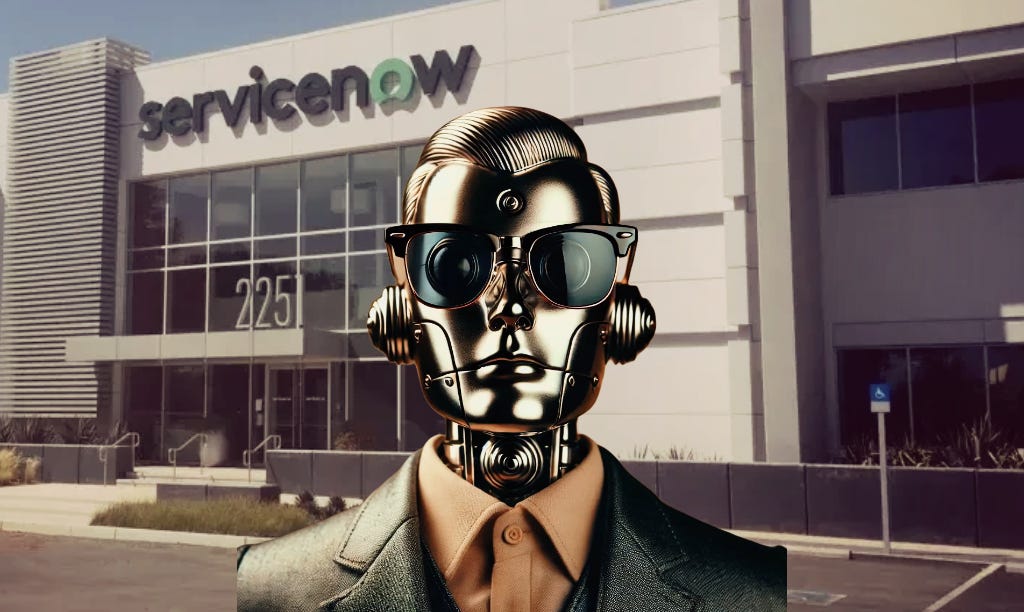SaaS is back! ServiceNow's $3b acquisition
What the Moveworks acquisition means for SaaS in the AI Market
Sharing real-world enterprise AI use cases, straight from conversations with early adopters actually deploying AI and enterprise agents. No fluff. Just what’s working, what’s not, and what’s next in AI & Agents for business. 🍺
Big moves are happening in the enterprise SaaS space. Yesterday, ServiceNow publicly announced the acquisition of Moveworks, a service desk AI company.
This is an exciting milestone, not just for the Moveworks team (congrats to them on a great exit), but also for what it signals about the future of SaaS and AI adoption.
Let’s break it down.
It was reported (but unconfirmed) that Moveworks was generating around $100M in revenue with moderate growth—rumors suggest 20-30% YoY revenue growth, which isn’t hyper-growth but decent.
Despite this, ServiceNow is acquiring Moveworks at an estimated 25-30x revenue multiple. That’s a significant valuation and a strong signal for what has been an absolutely desolate market for startup liquidity.
Why is ServiceNow making this move?
For one, IT service desk automation is currently the leading agentic use case that enterprises are actually deploying.
The “State of AI Agent Development Strategies in the Enterprise” survey, which gathered insights from over 1,000 enterprise technology leaders and practitioners, ranked the top areas where enterprises are prioritizing AI agents to address critical business challenges. The top use case? IT Service Desk Automation : )
Instead of just surfacing knowledge, ITSM Agents can execute critical tasks such as resetting passwords, provisioning software, and filing support tickets, eliminating the need for human intervention. This shift represents a massive efficiency gain for enterprises, streamlining IT operations and allowing teams to focus on more strategic initiatives rather than routine service requests.
This audience is squarely in ServiceNow’s wheelhouse.

Second, enterprise SaaS giants are being disrupted. I talked about this in my previous posts, but the traditional per-seat licensing model is under pressure, and there’s growing scrutiny over how enterprise software is actually being used.
One example? The Department of Government Efficiency DOGE (yes, yes I know, this isn’t a political statement) found that the General Services Administration had 35,855 unused ServiceNow licenses. Now this is an extreme case, but this one example could represent > $40m in churned ARR for ServiceNow. Extrapolate similar waste across 8k+ customers and “Houston, we have a problem..”.
ServiceNow must find ways to diversify and modernize their pricing and packaging.
Finally, AI is now the standard. When ServiceNow, Salesforce, and Workday rose to prominence, being cloud-first was the disruptor. Now, AI-first strategies are reshaping the competitive landscape.
The incumbents are racing to extend their offering with AI and are hoping that they can fend off the flurry of AI-first startups entering the market. Will it work?
Here’s a spicy take from Vijay Rayapati “Today’s ServiceNow drop beyond market correction is a clear reminder: Bolted-on agentic AI or patched-in AI isn’t enough. Enterprise Software 3.0 is here and it will be delivered by new companies in CRM, HCM, ITSM, ESM, ERP. None of the large and entrenched incumbents who are used to renewal $ extraction and SKU-obsessed expansion can drive the real transformation for your business.”
It’s clear the acquisition of Moveworks isn’t just about adding AI capabilities to ServiceNow, it’s about survival. The enterprise SaaS model is under pressure, and legacy vendors are being forced to rethink pricing, product strategy, and long-term value.
Customers are increasingly skeptical of outdated seat-based licensing models, especially when they see millions of dollars in unused licenses across large enterprises. AI-driven automation is further reducing the need for traditional software seats, meaning the revenue streams that companies like ServiceNow, Salesforce, and Workday have relied on for years are shrinking.
At the same time, the real AI-native challengers are emerging. These aren’t just platforms with AI bolted on, they are built from the ground up to be AI-first, Agent-driven, and fully connected across enterprise workflows.
The market is evolving. AI is reshaping enterprise software. The only question is who adapts and who gets left behind.
🔗 Dive deeper on this topic
[Blog] - Jason Lemkin wet blanket take from SaaStr
[Blog] - Why IT needs an AI-powered Support Agent from Tray.ai
I started this newsletter because I am frustrated by the lack of tangible Enterprise AI use cases in the market.
I have the opportunity to speak to hundreds of tech and systems leaders and fundamentally believe that AI and Agents will change the way businesses operate. My goal is to help share how.
-Nate G
PS - I went to Regionals in “Power of the Pen” in 8th grade so I consider myself a fairly prolific writer.





